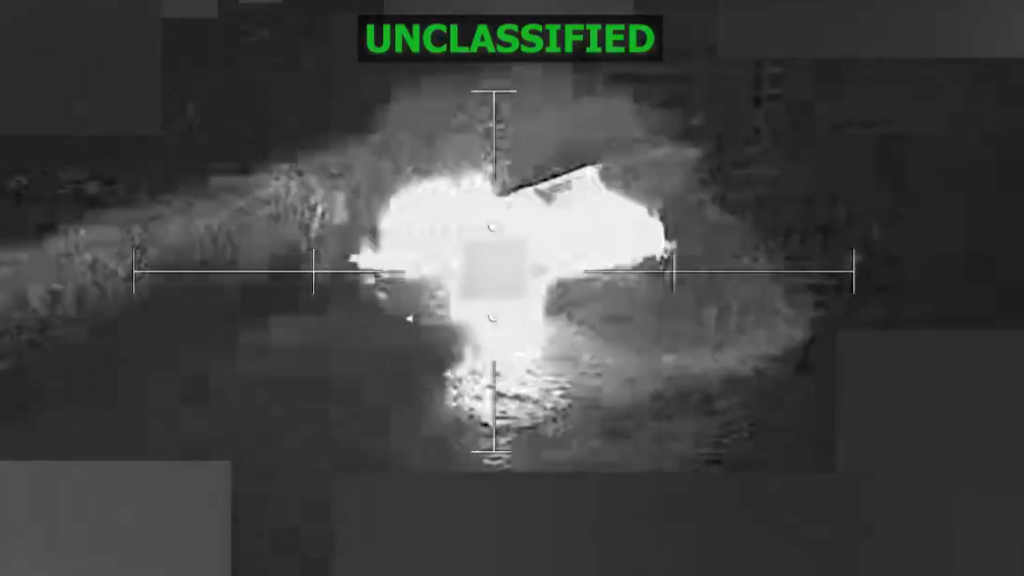“`html
U.S. airstrikes targeting suspected drug trafficking vessels in the Caribbean Sea and eastern Pacific Ocean have continued since early September under the banner of Operation Southern Spear.
The deployment of tens of thousands of troops, coupled with significant air and naval power, represents the largest U.S. military presence in and around Latin America in recent decades.
On Sunday, the U.S. military confirmed that the USS Gerald R. Ford, the world’s largest aircraft carrier, had arrived in the Caribbean region.
The Trump administration has defended the strikes as a necessary measure to combat the flow of illicit drugs into the United States.
However, the operation has faced criticism and sparked concerns about a potential escalation of conflict in the region.
President Trump and his administration have asserted that the strikes are a crucial counter-narcotics effort to curtail the trafficking of drugs from Latin America to U.S. communities.
Defense Secretary Pete Hegseth stated that Operation Southern Spear, officially named on November 13, aims to eliminate “narco-terrorists from our hemisphere” and protect the U.S. from “the drugs that are killing our people.”
The Pentagon has released limited information regarding the specific targets and their alleged affiliations with drug trafficking organizations.
In some instances, Secretary Hegseth and other officials have linked the targets to Tren de Aragua, a Venezuelan gang designated as a foreign terrorist organization earlier in the year.
The extent to which these strikes are impacting overall drug flow, a significant portion of which transits the U.S.-Mexico land border, remains unclear.
The U.S. has positioned substantial military assets within striking distance of Venezuela in the Caribbean and western Atlantic.
BBC Verify has identified 15 warships in the region based on ship-tracking data, satellite imagery, and official announcements.
This includes the USS Gerald R. Ford aircraft carrier, which the U.S. Navy touts as “the most capable, adaptable, and lethal combat platform in the world.”
The deployment also encompasses guided-missile destroyers and amphibious assault ships capable of deploying thousands of troops.
Furthermore, U.S. combat aircraft have been stationed at bases in Puerto Rico, and long-range bombers have flown within striking distance of the Venezuelan coastline.
President Trump has also acknowledged authorizing covert CIA operations in Venezuela, the full scope of which remains classified.
Between September 2 and November 16, U.S. forces conducted at least 22 strikes on vessels in international waters, both in the Caribbean and the eastern Pacific.
The majority of these strikes have occurred off the coasts of Venezuela and Colombia.
U.S. Southern Command announced on Sunday that its latest strike, carried out on Saturday in eastern Pacific international waters, resulted in the deaths of three individuals labeled as “male narco-terrorists.”
“Intelligence confirmed that the vessel was involved in illicit narcotics smuggling, transiting along a known narco-trafficking route, and carrying narcotics,” Southern Command stated on X, accompanied by a video of the boat exploding.
In total, at least 83 people have been killed in these strikes.
While U.S. forces have not publicly identified them, they have all been characterized as “narco-terrorists.”
An investigation by the Associated Press indicated that some of the Venezuelan nationals killed in the strikes were low-level traffickers driven by poverty, including at least one local crime boss.
The Trump administration has maintained that the strikes are legal, citing a right to self-defense aimed at protecting American lives.
In a confidential note to Congress, the administration asserted that the U.S. is engaged in an armed conflict with drug cartels, which it considers “unlawful combatants” whose actions – drug trafficking – “constitute an armed attack against the United States.”
However, some legal experts argue that the strikes may be illegal and violate international law by targeting civilians without due process.
Luis Moreno Ocampo, a former chief prosecutor at the International Criminal Court (ICC), told the BBC that he believes the strikes could potentially be classified as crimes against humanity.
Critics have also questioned whether the White House initially complied with U.S. law when authorizing the strikes.
According to the U.S. Constitution, only Congress has the power to declare war.
In October, President Trump stated that the U.S. is “allowed” to strike vessels near Venezuela but that his administration “may go back to Congress” if the campaign were expanded to include land-based targets.
“We don’t have to do that,” he said. “But I think…I’d like to do that.”
The military build-up has fueled concerns that the U.S. is considering a direct intervention in Venezuela, possibly aimed at toppling the socialist government of President Nicolás Maduro.
On November 3, President Trump downplayed the likelihood of a war with Venezuela but suggested that he believed President Maduro’s time in office was limited.
Asked if the U.S. was preparing for war with Venezuela, the U.S. president told CBS’ 60 Minutes: “I doubt it.”
“I don’t think so,” he added. “But they’ve been treating us very badly.”
The Maduro government has accused the U.S. of escalating tensions in the region with the goal of overthrowing the government.
In response, the Venezuelan military has announced readiness exercises and, in November, declared a “massive mobilization” of troops, deploying 200,000 personnel across the country.
Maduro has warned against U.S. intervention in Venezuela and called for peaceful resolutions.
“No more forever wars. No more unjust wars. No more Libya. No more Afghanistan,” Maduro said on CNN on November 13. “Long live peace.”
Additional reporting by Tom Edgington
The new voting maps, designed to strengthen Republican majority in next year’s midterm polls, triggered a nationwide redistricting battle.
The Portuguese player is being paid handsomely to be part of the gulf state’s modernisation plan.
The cargo ship lost power before crashing into the Francis Scott Key Bridge, leaving six workers dead.
The US president’s claims that the crown prince knew nothing’ contradict the CIA’s own assessment.
The new criminal investigation comes as the music mogul is serving a 4-year prison term.
“`

